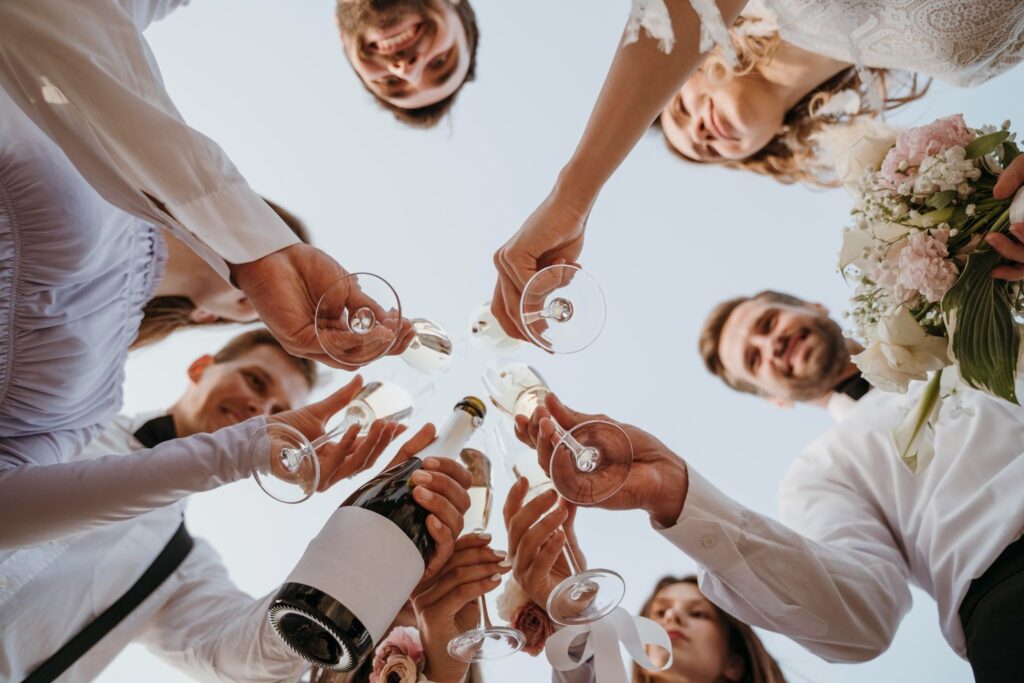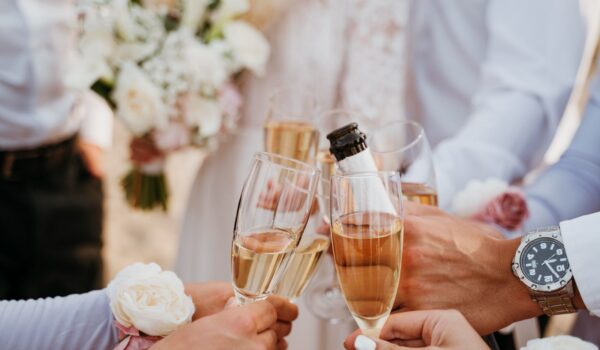Avoiding the dreaded scenario of running out of alcohol is undoubtedly crucial, yet equally vital is ensuring that your expenses remain within reasonable bounds. Balancing the desire to enjoy oneself with the need to adhere to a budget can sometimes feel like an impossible task, reminiscent of the old adage about wanting to have your cake and eat it too.
However, fear not, for the solution lies within the realm of a wedding alcohol calculator. Yes, you heard that right; this tool is your key to maintaining a delightful ambiance at your splendid wedding without breaking the bank.
Here’s the catch: estimating the appropriate quantity of alcohol required can prove to be quite challenging and even exasperating if you lack the necessary resources. Hence, allow me to guide you through this process, ensuring a smooth and stress-free experience.
A Comprehensive Comparison: Full Bar vs. Limited Bar for Your Wedding
Choosing the alcohol that you’ll serve at your wedding can be overwhelming. But contrary to popular belief, the key to a perfect wedding alcohol menu isn’t providing every type of alcohol known to mankind.
Yes, you read that correctly!
Research shows that an abundance of choices might not always translate to a better experience. Ultimately, the right selection of alcohol suits your budget, complements your food menu, and caters to your guests’ tastes.
So, let’s simplify things. Here’s a head-to-head comparison of your options: a full bar versus a limited bar.
Full Bar
A full bar is the traditional approach to serving alcohol at weddings. It includes a wide range of beers and wines, with multiple choices for each. But it doesn’t stop there. A full bar also features a selection of liquor to accommodate virtually any cocktail request from your guests. This is complemented with mixers, garnishes, and fruits. A full bar caters to diverse preferences but might need careful planning given its extensive nature.
Limited Bar
A limited bar, as the name suggests, offers a more streamlined selection of alcohol. This doesn’t mean it lacks appeal, though. A limited bar can still satisfy most guests by offering beers and wines or beers, wines, and one or two signature cocktails.
Creating a signature cocktail for your wedding can add a personal and creative touch. It’s tempting to dive into crafting your unique concoction, but stay focused!
Opting for a limited bar can be a savvy choice if you’re stocking the bar yourselves. It narrows down the volume of alcohol you need to purchase, which can save you time, stress, and money.
Now that you understand the key differences between a full and limited bar, the next step is to decide which one suits your wedding best. Remember, it’s your special day! Choose an option that reflects your tastes, aligns with your budget, and caters to your guests’ preferences. Read about the magic with Miss to Mrs Box – your key to bridal joy! Unbox the excitement, love, and surprises on your journey from miss to Mrs!
The Bare Essentials Bar: Serving Beer and Wine Only
While a full bar may seem like the epitome of wedding luxury, a more modest beer and wine only bar is a popular choice, and for good reason. Offering beer and wine alone can cater to a broad range of tastes and is often more budget-friendly without compromising the celebratory spirit.
Typically, the ratio for a beer and wine-only bar is 40% beer and 60% wine. Why this particular percentage? It ensures a balanced blend that accommodates different preferences, but those numbers aren’t set in stone. They may vary based on your crowd’s drinking culture and the kind of wedding you’re hosting.
An advantage of the beer/wine bar is it reduces the need for mixers, garnishes, and different types of glassware, making logistics simpler and often more cost-effective.
Quick Tips for a Successful Beer/Wine Bar:
- Diversify your offerings: Variety is still vital even with a beer and wine-only bar. Providing a few types of each will cater to diverse tastes among your guests.
Beer Choices
The world of beer offers a plethora of options. Here’s a basic list of crowd-pleasing brands to consider:
Domestic Beers: Look for classic labels like Budweiser/Bud Light, Coors/Coors Light, Blue Moon, Sam Adams, Yuengling, Shock Top, and Sierra Nevada.
Imported Beers: Brands like Corona, Stella Artois, Amstel, and Heineken are globally recognized and widely liked.
Trending Beers: Currently, IPAs are increasingly popular. If your crowd enjoys craft beers, adding a few IPAs to your menu is a worthwhile consideration.
Wine Variations
The variety of wine types may seem narrower, but there’s more than enough to explore. Generally, wine types fall into four categories: Dry Red, Dry White, Sweet Red, and Sweet White. It’s a good idea to offer at least one from each category.
Here’s a bonus tip to curate your wine offerings: the weather might influence wine consumption. On warmer days, guests lean towards white wine; while on cooler days, red wine wins hearts. Keep this in mind when placing your orders!
Spice it up with Signature Cocktails: Adding Personal Flair to Your Bar
For couples who wish to imbue their bar offerings with a touch of personal style, introducing a signature cocktail can bring an intimate and playful element to the wedding celebration. Balancing the beer, wine and spirit offerings can be tricky, but a recommended ratio that tends to work well is 30% beer, 50% wine, and 20% spirits for your signature cocktails.
As this combination adds another layer of complexity to your bar, ensuring seamless service becomes crucial. Hence, you might want to consider a wedding alcohol calculator to help accurately estimate quantities and avoid oversupply or undersupply.
When it comes to designing your signature cocktails, it’s valuable to reflect your personalities or shared memories as a couple. This not only adds a fun twist to your bar but also makes for great conversation starters among your guests.
Crafting Your Signature Cocktail: Top Tips
- Simple but tasty: Your signature cocktail should ideally have a few simple ingredients and be quick to make. This ensures smooth service, preventing long queues at the bar;
- Pre-mix for speed: If the cocktail involves more than a couple of steps, bartenders can prepare a few batches in advance and pour them into pitchers ready for the cocktail hour rush;
- Familiar favorites: Your signature cocktail doesn’t have to be an exotic concoction. It could be a familiar drink like a Mojito or a Whiskey Sour, but with a fun, personalized name;
- Non-alcoholic options: Remember, not all your guests may consume alcohol. Offering a non-alcoholic variant of your signature drink, like a virgin Mojito or a refreshing berry-infused iced tea can be a thoughtful gesture;
- Season-appropriate: Your signature cocktail can also reflect the season when your wedding is taking place. For instance, a refreshing cucumber-mint cooler works well for summertime, while a warm mulled cider might be the perfect accompaniment for a winter wedding.
Remember, the aim is to ensure your bar is well-stocked and service is smooth, but most importantly, that it reflects this joyous occasion’s true spirit – the celebration of your love story.
Keeping it Cool: Considering Ice Availability at Your Wedding
While arranging for the alcohol is a considerable task, one crucial aspect that often goes unnoticed is ice provision. Having an ample supply of ice is essential for keeping drinks chilled and creating the perfect cocktail. Therefore, knowing who will provide the ice for your wedding becomes a significant factor.
Typically, the responsibility of ice provision lies with the caterer/bartender or the venue. Their experience in handling such events makes them best suited for this task. They can estimate how much ice you’ll need and ensure it’s available throughout the event.
Before assuming this responsibility yourself, consider the following benefits of having your caterer or venue handle this:
- Reduced stress: Offloading this task means one less thing to worry about, giving you more time to focus on enjoying your special day;
- Day-of purchase: Ice is an item that needs to be bought and delivered on the day. Your vendor’s experience, necessary resources, and workforce can ensure the seamless execution of this task;
- Availability assurance: If the ice supply runs low, the burden of arranging for more falls to them, not you.
However, in situations where you are responsible for providing ice, here’s what you need to keep in mind:
For a basic estimate, you’d need approximately 1.5 pounds of ice per guest. If you’re also using the ice to chill drinks like white wine, beer, and champagne, anticipate needing more – around 2.5 pounds per guest. Always have more than you think you’ll need to keep beverages refreshing and guests satisfied.
Remember, a seamless and memorable wedding isn’t just about having the perfect alcohol menu, but also about ensuring the drinks are served at their best. A well-thought-out arrangement for ice provision can go a long way in enhancing your guests’ overall experience.
The Art of Calculating Alcohol Quantities for Your Wedding
Planning a wedding involves a host of meticulously curated details, one of the significant being the selection and quantification of alcohol. So, how does one estimate the numbers without falling short during the celebration or overspending on unnecessary additional quantities?

The process involves considering your guest list and the duration of your event, followed by a simple calculation. Here’s a step-by-step guide that is effective for most weddings.
Understand Your Crowd
Begin by taking a close look at your guest list. Factors to consider include:
- Drinking habits: Does your guest list comprise of heavy, moderate, or light drinkers? A crowd with a higher number of heavy drinkers may require more alcohol than one with mostly light drinkers;
- Non-drinkers: Consider the guests who don’t consume alcohol. Subtracting their number from your total guests gives you a more accurate figure to calculate your alcohol needs.
Calculate the Total Number of Drinks
Estimated drink consumption can be determined by multiplying the number of guests (who will be drinking) by the number of hours your event will last (excluding the ceremony).
For instance, if your reception will last for 5 hours and you have 100 attendees who drink, you’ll need:
100 guests x 5 hours = 500 drinks
Break Down by Type of Alcohol
Once you have the total number of drinks, decide the percentages of each type of alcohol based on the type of bar you’re hosting. Aim for a balanced mix that caters to diverse tastes.
Here’s a reference for breaking down quantities:
- Beer: Considering 40% for a beer/wine only bar, you’d need 200 beers (about 9 cases);
- Wine: The remaining 60% would be 300 glasses of wine (approximately 25 cases).
Handy Quantities to Remember:
- A case of beer contains 24 bottles (bottles or cans are usually preferred over kegs);
- A wine case holds 12 bottles;
- A 750ml bottle of wine provides around 5 servings (5oz each);
- A 750ml liquor bottle produces about 12-15 servings (1.5-2oz each);
- A 750ml champagne bottle yields approximately 5-7 servings (3-4 oz. each).
This approach offers a reliable estimate for your wedding alcohol needs. However, every event is unique, so adapt these guidelines to suit your celebration.
Conclusion
In conclusion, utilizing a wedding alcohol calculator not only helps in avoiding the inconvenience of running out of alcohol but also contributes to managing expenses effectively. By striking a balance between enjoyment and budgetary considerations, this tool becomes an invaluable asset for planning a memorable and financially prudent wedding celebration. So, embrace the assistance of the alcohol calculator, and may your wedding festivities be filled with joy, cheer, and delightful moments for all.
